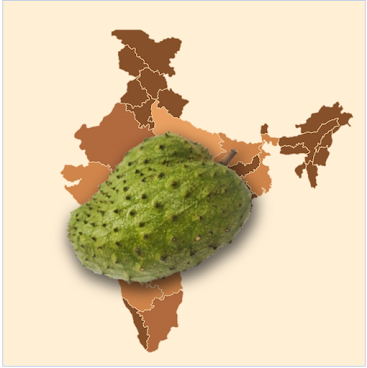The Soursop is the fruit of the tropical tree which is also termed Graviola, Laxmanphal, kaattu aatha palam, Mullen Chakka, Mullu Seettha, Annona muriata, Graviola, Guyabano. proper origin from Brazil, also found in Sri Lanka as well as the southern part of India. It has an aroma similar to pineapple, the flavor of the fruit has been described as a combination of strawberries and apple, and sour citrus flavor notes, contrasting with an underlying creamy texture reminiscent of coconut or banana. The Soursop fruit contains the rich Vitamin C which helps to cure cancer. Soursop fruit is a sweet fruit, seedy fruit with a pure white flush and coated with a green-yellowy colored skin.
People in Africa
and South America use the bark, leaves, roots, and fruits of the Graviola tree.
They treat infections with viruses or parasites, rheumatism, arthritis,
depression, and sickness. We know from research that some Graviola extracts can
help to treat these conditions.

Soursop fruit structural description
Annona muricata
Annona muricata is a species of the genus Annona of the custard apple tree family, Annonaceae, which has edible fruit.[4][5] The fruit is usually called Soursop due to its slightly acidic taste when ripe. Annona muricata is native to the Caribbean and Central America but is now widely cultivated – and in some areas, becoming invasive – in tropical and subtropical climates throughout the world, such as India.[4][5]
The annona
muricata fruit is generally called guanábana in
Hispanic America, and the tree is a guanábano. Both tree and fruit
were called catuche in some parts of Venezuela, but that word is
currently less commonly used. It is known as sirsak in
Indonesia.
Annona muricata is also the main host plant for tailed jay (Graphium agamemnon)
caterpillars. They eat the leaves voraciously and usually stick under the
leaves to pupate.
Description :
Botanical drawing showing flower, leaves, and fruit
Annona muricata is a small, upright, evergreen tree that can grow to
about 30 feet (9.1 m) tall.[4][5][8][9]


Comments
Post a Comment